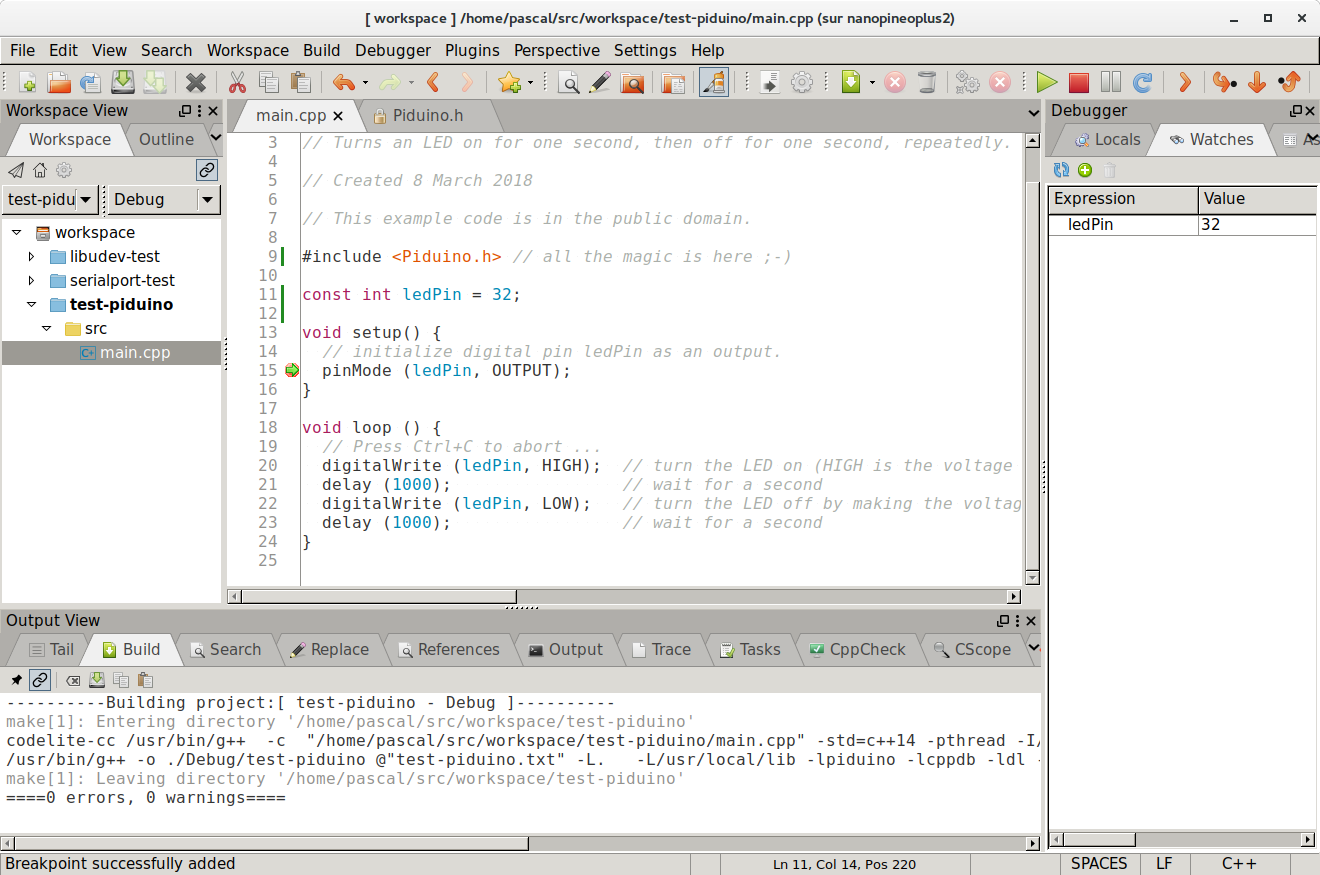A C++ wrapper for the libmodbus library
libmodbus is a free software library to send/receive data according to the MODBUS protocol. This library is written in C and supports RTU (serial) and TCP (Ethernet) communications.
The libmodbuspp library provides a C++ overlay to libmodbus, a wrapper, having no other dependency than libmodbus and libstdc++
A good example always better than a long explanation, this is an extremely simple example:
uint16_t values[2]; // array to store the values of the input registers
Master mb (Rtu, port, "19200E1"); // new master on RTU
mb.open(); // open a connection
mb.setSlave (33); // to the slave at address 33
mb.readInputRegisters (1, values, 2);
cout << values[0] << endl;
cout << values[1] << endl;This example reads the input registers number 1 and 2 of the MODBUS slave (server) at address 33.
The fastest and safest way to install libmodbuspp on Debian, Armbian, Raspbian ... is to use the APT repository from piduino.org, so you should do the following :
wget -O- http://www.piduino.org/piduino-key.asc | sudo apt-key add -
sudo add-apt-repository 'deb http://apt.piduino.org stretch piduino'
sudo apt update
sudo apt install libmodbuspp-dev libmodbuspp-doc
This repository provides Piduino packages for i386, amd64, armhf and
arm64 architectures.
In the above commands, the repository is a Debian Stretch distribution, but you
can also choose Ubuntu Xenial or Bionic by replacing stretch with xenial or
bionic. It may be necessary to install the software-properties-common
package for add-apt-repository.
For Raspbian you have to do a little different :
wget -O- http://www.piduino.org/piduino-key.asc | sudo apt-key add -
echo 'deb http://raspbian.piduino.org stretch piduino' | sudo tee /etc/apt/sources.list.d/piduino.list
sudo apt update
sudo apt install libmodbuspp-dev libmodbuspp-doc
The Raspbian repository provides Piduino packages for armhf architecture for Stretch only.
If you want to build from sources, you can follow the Wiki.
Here is a complete example that can be compiled without error:
#include <iostream>
#include <string>
#include <modbuspp.h>
using namespace std;
using namespace Modbus;
int main (int argc, char **argv) {
string port ("/dev/ttyUSB0");
Master mb (Rtu, port , "38400E1"); // new master on RTU
if (mb.open ()) { // open a connection
// success, do what you want here
uint16_t values[2];
mb.setSlave (33); // to the slave at address 33
if (mb.readInputRegisters (1, values, 2) == 2) {
cout << "R0=" << values[0] << endl;
cout << "R1=" << values[1] << endl;
}
else {
cerr << "Unable to read input registers !" << endl;
exit (EXIT_FAILURE);
}
mb.close();
}
else {
cerr << "Unable to open MODBUS connection to " << port << endl;
exit (EXIT_FAILURE);
}
return 0;
}Enter the text of this program with your favorite text editor and save the file
in main.cpp
To build, you must type the command:
g++ -o read-input-registers main.cpp $(pkg-config --cflags --libs libmodbuspp)
You can then run it :
./read-input-registers
R0=9964
R1=10029
With Codelite it's easier and funny, right ?
You will find several examples in the folder /usr/share/doc/modbuspp/examples
The libmodbuspp-doc package provides documentation.
The classes provided by the library are documented by man pages:
- The Modbus_Master page for the
Modbus::Masterclass - The Modbus_Data page for the
Modbus::Dataclass - The Modbus_RtuLayer page for the
Modbus::RtuLayerclass - The Modbus_TcpLayer page for the
Modbus::TcpLayerclass - The Modbus_Timeout page for the
Modbus::Timeoutclass
The complete API is documented in the folder /usr/share/doc/modbuspp/api-manual
MODBUS is considered an application layer messaging protocol, providing Master/Slave communication between devices connected together through buses or networks. On the OSI model, MODBUS is positioned at level 7. MODBUS is intended to be a request/reply protocol and delivers services specified by function codes. The function codes of MODBUS are elements of MODBUS’ request/reply PDUs (Protocol Data Unit).
In order to build the MODBUS application data unit, the client must initiate a MODBUS transaction. It is the function which informs the server as to which type of action to perform. The format of a request initiated by a Master is established by the MODBUS application protocol. The function code field is then coded into one byte. Only codes within the range of 1 through 255 are considered valid, with 128-255 being reserved for exception responses. When the Master sends a message to the Slave, it is the function code field which informs the server of what type of action to perform.
To define multiple actions, some functions will have sub-function codes added to them. For instance, the Master is able to read the ON/OFF states of a group of discreet outputs or inputs. It could also read/write the data contents of a group of MODBUS registers. When the Master receives the Slave response, the function code field is used by the Slave to indicate either an error-free response or an exception response. The Slave echoes to the request of the initial function code in the case of a normal response.
